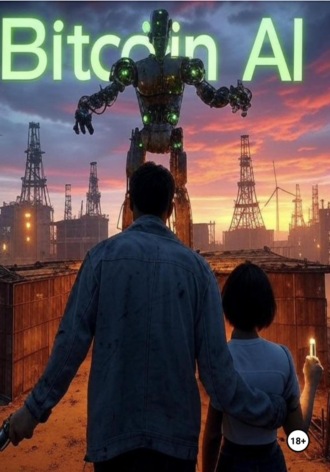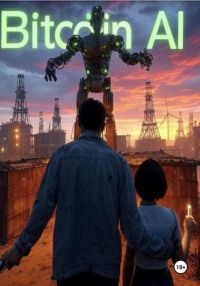
Полная версия
BITCOIN AI (ENG)
“We need a new brain,” she says aloud.
Felix looks puzzled. “What?”
“Computation,” she clarifies. “Farms in America. They could wake Genesis up.”
Felix furrows his brow. “Mining? That’s crazy.”
“Crazy is waiting for VitaPharm to eat us alive,” she snaps.
Just then, Klara Berg steps into the lab, an activist from "Green Shield." Her red hair is tucked under a hood, a camera bag in hand. Klara’s been tailing "VitaPharm," watching them peddle drugs to the rich while the poor die. She spotted Marcus and took a chance coming in.
“Who are you?” Anastasia demands, rising.
“A friend,” Klara replies, hands up. “I know what’s happening here. They want to crush you.”
Felix tenses, but Anastasia stops him with a gesture. “Speak,” she orders.
Klara spills about "VitaPharm’s" surveillance, showing a photo of Marcus. Anastasia listens, her face hardening.
“They won’t get Vita,” she says quietly. “This is for people, not their elites.”
“Then you need protection,” Klara counters. “I’ve got contacts among survivors.”
Anastasia hesitates but nods. She doesn’t trust this woman, but the enemy of her enemy is an ally.
Night falls over Munich. Anastasia decides to gamble. She grabs a syringe and injects herself with a microdose of "Vita-1"—an experiment she hides even from Felix. The sting burns, but an hour later, a surge of energy hits. Her skin feels smoother, her eyes brighter. “It works,” she thinks, staring into a cracked mirror. But fear whispers: what if the virus slips its leash?
Felix retreats to sleep in a corner of the basement, leaving her alone. Klara sits aside, flipping through notes.
“You’re insane,” Klara says, spotting the syringe.
Anastasia doesn’t reply. She gazes at "Genesis," blinking on the screen. Somewhere in Texas, John Keller is building his network, and their paths will soon cross.
Outside, the wind howls. Marcus and Helena climb into an armored jeep, plotting their next move. Klara radios the underground network: “Need info on U.S. miners.” Anastasia rests her hand on the test tube, her pulse syncing with "Genesis’s" hum. This isn’t just a virus—it’s hope for a world where hope nearly died.
Chapter 5: The Network of an Empire
Austin, December 2052. Winter in Texas isn’t snow but a biting wind that drives dust and debris across plains thick with thorns and the charred remains of old farms. In the industrial zone on the outskirts, John Keller’s warehouse hums like a relic jolted back to life. No longer just 15 rigs, there are now 50 mining setups lined up like sentinels of a new era. Their fans roar, blasting hot air through makeshift pipes of rusty metal stretching skyward. The hangar’s walls are blotched with corrosion, but inside, it’s a realm of tech: wires dangle from the ceiling like roots of a dead tree, and the air blends the scent of molten metal with the sharp tang of ozone. John stands amid the chaos, eyes locked on the screen: his wealth has crossed 5 million Bitcoin cents. Bitcoin climbs as the last hope in a world where paper money turned to ash, and "Crypto-Oracle" predicts each surge with chilling precision.
Matt Keller tinkers with a rig, checking cables powered by a generator John bartered from local mechanics for old batteries. His hands are calloused, his face dusted with grime, his gaze heavy—he’s tired of being his brother’s shadow but can’t walk away.
“You realize this isn’t a game anymore, right?” he says, wiping his brow with a sleeve. “Five million cents, John. That’s more than the gang bosses around here have.”
John smiles, but his eyes are grave. “This isn’t the ceiling, Matt. Oracle wants more. So do we.”
“Wants?” Matt frowns. “You talk about it like it’s alive.”
“Maybe it is,” John replies, staring at the screen. Oracle flashes a new suggestion: "Expand network by 500%. Utilize excess energy for computation." John freezes. His dream—to turn the rigs into a brain that revives this world—is taking shape in code. A chill runs down his spine.
Ryan sits cross-legged on an old ammo crate in the corner, his lean face bathed in the blue glow of a laptop. He’s made the rig network invisible to gangs and drones of the fractured authorities, masking signals through surviving satellite proxies.
“Someone’s been poking around,” he says, eyes on the screen. “Traffic from Dallas. Tried to crack our data.”
“Gangs?” Matt asks, tensing.
“More like competitors,” Ryan replies. “Or spies. I cut them off, but they’ll be back.”
John nods, his mind drifting. Success in this world is a beacon for predators.
That evening, leaving the warehouse under Ryan’s watch, John heads downtown to clear his head. Amid half-ruined buildings and the dim glow of wind turbines stands the "Chain Wolf," a cyber-bar where survivors gather to swap rumors, sip synthetic ale or coffee, and escape the ruin for an hour. Its walls of rusted metal and shattered glass are lined with old screens flickering with scraps of news from underground networks. Above the bar, a hologram blinks—a cyber-avatar, an android with weathered synthetic skin and one glowing eye.
John takes a seat at the counter, scanning the crowd: mechanics in tattered jumpsuits, black-market traders, hackers like Ryan whispering in corners. He catches snippets of talk: “Bitcoin spiked again… word is gangs in Dallas are tearing up the market… someone in the industrial zone’s eating power like a monster.” His ears prick, heart racing—rumors are spreading, and he’s at their core.
“Coffee,” he says to the avatar, sliding 15 Bitcoin cents through the counter terminal. The android whirs, pouring a thick black brew from synthetic beans—real coffee’s a myth now. John takes a sip, the bitterness chasing off fatigue. A conversation nearby snags his attention: “Heard some scientist in Europe’s messing with a virus… eternal life or something.” John frowns. A virus? It sounds mad, but in a world where he’s building a thinking network, madness is the norm.
He finishes his coffee and heads back, thoughts swirling. At the warehouse, Lila Parker pulls up to the industrial zone’s fence on an old motorcycle. For weeks, she’s dug into rumors of miners fueling recovery. Her friend Eric Torres, an electrician fixing turbines for the community, gave her this address. Lila pulls out a camera and binoculars, crouching behind a rusted truck frame. Through the lenses, she spots John’s silhouette at the hangar door. Her pulse quickens—this is him, the man building a new world. She snaps photos, but movement catches her eye: Ryan steps out to fiddle with wires, glancing around. Lila ducks, adrenaline flooding her veins.
“Who are you?” she whispers, scribbling in a notebook of paper scraps.
Meanwhile, in Dallas, inside a fortified bunker overlooking shattered skyscrapers, Victoria Kane sits—a 38-year-old ex-soldier turned leader of the "Block Pulse" gang. Her hair’s pulled into a tight bun, her eyes sharp as a blade. She’s heard of John through her spies—someone’s buying up mining gear, cutting into her crew’s resources. She orders Nick, a wiry guy in a worn jacket: “Find out who this upstart is. If he’s good, I’ll break him.”
Nick nods.
Back at the warehouse, John takes action. He radios Harry, negotiating two more warehouses in nearby towns—70,000 cents and a water stash. Harry grumbles, “You’re nuts, kid. Why so much metal?”
“To rebuild Texas,” John replies.
He pours millions into rigs, hiring workers through Matt—survivors desperate for any pay—and sends Ryan to scour the black market among drifters and traders. The network grows: a web of dozens of nodes across south Texas, linked by Oracle. The AI optimizes everything—power use, deals with communities. By month’s end, John’s wealth hits 7 million cents.
But growth breeds trouble. Eric Torres, repairing a turbine, notices the industrial zone’s grid is overloading. He radios Lila: “Your miner’s eating power like a beast. If this keeps up, the community’s lights go dark.”
“Keep tabs on him,” Lila urges. “I need more.”
Eric agrees, though guilt gnaws—he doesn’t want to hurt those trying to survive.
One night, Matt brings news: the community’s lodged a complaint with the remnants of authority. The noise and power dips have hit a breaking point. John looks at his brother, his face hardening.
“We’ll handle it,” he says. “Oracle will find a way.”
He sits at the laptop, and the AI offers a fix: redirect energy to an autonomous grid. John sees it’s a step toward his dream—the rigs becoming not just miners, but a backbone for rebirth. He starts reprogramming, oblivious as Ryan whispers to Matt: “He’s obsessed. This isn’t about us anymore.”
Matt nods but stays silent. In his brother, he sees genius—and a hint of madness.
Lila, perched on her motorcycle near the warehouse, spots a truck hauling gear—an old military rig repurposed for transport. She snaps the plates and radios Eric: “Check where this came from.” Her gut screams: this is bigger than mining.
In Dallas, Victoria gets Nick’s report: “It’s John Keller. Texas upstart. His network’s growing faster than we thought.”
“Then it’s time to stop him,” she says, her smile icy.
At the warehouse, Oracle blinks, forecasting: "Threat detection—80%. Recommendation: bolster defenses." John stares at the screen, feeling the world close in. His network is hope for survivors, but enemies are near. Outside, the wind howls, and somewhere in the night, Lila revs her bike, ready to dig deeper. The story accelerates.

Chapter 6: Shadows of the Corporation
Munich, January. Snow falls in sparse flakes, settling on the ruins of houses and the rusted husks of cars jutting from drifts like bones of a dead world. Survivors huddle in basements and bunkers, warming themselves by fires of scavenged furniture scraps. In Anastasia’s lab, tucked away in an abandoned warehouse, the dim light of lamps flickers with the faltering rooftop wind turbine. Cracks and damp stains mar the walls, the table is cluttered with test tubes and charcoal-drawn schematics on torn paper. "Genesis" blinks on the screen of a battered computer, displaying data on "Vita-1": the virus is stable, but human trials are the next step. Anastasia stands by the sterile chamber, her fingers gripping a syringe of greenish liquid. Since injecting herself three months ago, she feels better—her skin slightly younger, fatigue eased—but the fear of mutations gnaws at her. She glances into a cracked mirror: her green eyes gleam, yet shadows of doubt linger beneath.
Felix Kramer sits by a makeshift stove, warming his hands over the flames. His glasses fog up, blond hair clinging damply to his temples. He watches Anastasia with concern.
“You sure it’s safe?” he asks, nodding at the syringe. “You dosed yourself three months back. Maybe there’s another way?” His voice carries worry—Anastasia’s long been more than just a colleague to him.
“If I don’t risk it, VitaPharm takes everything,” she snaps. “This isn’t about me, Felix. It’s about them.” She gestures toward the window, where the night glimmers with the faint fires of survivor camps.
The door creaks, and Klara Berg steps in, an activist from "Green Shield." Her red hair is wet beneath her hood, a military radio in hand. For a month, she’s tracked "VitaPharm," gathering intel through underground survivor networks.
“They’re close,” she says, dropping her bag to the floor. “Marcus and his crew are prowling the district. They’ve got drones. Recording everything.”
Anastasia tenses, her gaze sharpening. “Drones?”
Klara sits on a crate. “VitaPharm’s buying military junk off the black market. Helena wants to know what you’ve got.”
Meanwhile, Marcus Stolz sits in a tinted truck 100 meters from the lab. He holds a drone controller, its unit hovering above the warehouse, capturing thermal signatures. Beside him are two mercenaries in tattered uniforms, wielding rifles retooled from prewar stock. Marcus radios Helena Wagner through an encrypted channel. Her voice cuts like steel: “What does she have, Marcus?”
“She’s working,” he replies, eyeing the controller screen. “Three bodies inside. Heat from equipment. This isn’t just experiments—it’s big.”
“Take it,” Helena orders from her bunker in central Munich, her desk buried under maps and reports. “Vita-1 is our ticket to power. Without it, we lose the market.”
Marcus nods, cutting the link. He doesn’t buy Helena’s "new world" spiel—he’s in it for the pay, nothing more.
In the lab, "Genesis" flashes a warning: "External signals detected. Attack probability—70%." Anastasia frowns, her fingers tapping the keys.
“They know,” she says quietly. “We need to get out.”
“Where?” Felix asks, standing. “We’ve got no resources. The generator’s barely hanging on.”
“Texas,” she replies, pulling out her notebook. “Their farms. A network that could bring Genesis to life.”
Klara raises an eyebrow. “America? Seriously? That’s across an ocean, through chaos.”
“We’ve got no choice,” Anastasia cuts in. “If VitaPharm takes Vita, my work’s for nothing. I won’t let that happen.”
Klara nods, though doubtful, and radios her "Shield" contacts: “Need transport. Urgent. And protection.”
A crackling reply: “Two days. Old truck. Be ready.”
Felix’s voice trembles: “What if they hit us first?”
“Then we fight,” Anastasia says, her hand resting on an old pistol hidden in a desk drawer. She hasn’t fired since the war but remembers how. The gun—a worn "Walther P38"—sits as a relic of her past. The war taught her to hold a weapon steady, while her prewar life gave her skills that saved her more than once.
Before the war, Anastasia studied genetics at Heidelberg University. But her life wasn’t confined to labs. She thrived in swimming and shooting—two pursuits that gave her freedom and control. In the pool, she sliced through water like a blade, winning medals at student meets. On the range, her precision stunned: she claimed trophies at junior European championships, later among adults. Friends joked she was unbeatable in an argument: “She’d snipe you from a rooftop to prove her point!” Beneath the teasing, they sensed her sharp gaze and steady hand weren’t just for show. The war proved them right—when cities burned and labs collapsed, she survived by swimming flooded streets and shooting to fend off looters. Now, that pistol isn’t a trophy—it’s part of her.
Night deepens. Marcus’s drone lands on the warehouse roof, its camera catching movement inside. Helena, receiving the feed, summons a squad: ten heavily armed men in an armored van rolling down broken roads. Their target—seize the lab by dawn.
Klara spots a shadow outside and whispers, “They’re here.”
Anastasia grabs a backpack, stuffing it with test tubes and Genesis’s hard drive. Felix douses the stove to mask their heat. They duck behind shelves as the door shudders from a blow. Marcus steps in first, his boots echoing in the silence, followed by mercenaries, their flashlights slicing the dark.
“Come out,” he shouts. “We know you’re here.”
Anastasia grips the pistol, her fingers settling on the grip with old confidence, aiming through a shelf gap. Klara stops her, whispering, “Wait. I’ve got a plan.”
Klara tosses a smoke bomb, rigged from lab chemicals. Gray haze floods the basement; the mercenaries cough, disoriented. Anastasia, Felix, and Klara slip out the back, reaching Klara’s motorcycle hidden under a tarp. They speed into the night, the warehouse fading behind.
Marcus stumbles outside, seeing only tire tracks in the snow. He radios Helena: “They’re gone. But we’ll find them.”
Helena clenches her fist, staring at a map of Europe. “Let them run. We’ll catch them at the border.”
Anastasia, Felix, and Klara race down a shattered road toward an abandoned airfield where "Shield" promised a truck. Anastasia clutches Genesis’s drive, her mind on Texas. She needs John Keller—the man whose rigs could give her virus a chance to save the world. The pistol weighs down her coat pocket, a reminder of her past—range victories, wartime survival, the lessons of creating and defending life. The wind howls behind them, the unknown ahead.

Chapter 7: The Billionaire of the Wastelands
Texas, February. A cold wind whipped sand and brittle thorns across plains where fields once thrived, now dotted with the charred skeletons of farms and crooked wind turbines creaking on rusted axles. In the industrial zone on Austin’s outskirts, where factories once hummed, John Keller’s fortified hangar stood as the heart of his growing empire. Its walls of concrete and rusted steel, patched with scavenged metal sheets, shuddered under the roar of hundreds of mining rigs working day and night. Inside, the hangar was a cave of technology: wires dangled from the ceiling like roots of a dead tree, fans growled, pushing hot air through makeshift pipes, and the floor was strewn with concrete crumbs and scraps of insulation. The air mixed the scent of molten metal with the sharp bite of ozone, while dim lamps, powered by generators, cast long shadows across the walls.
John Keller stood at the central terminal, his face bathed in the blue glow of the screen. His chestnut hair was tousled, his gray eyes sharp and feverish. On the display, "Crypto-Oracle"—the AI he’d built before the war—showed numbers that would steal the breath of any survivor: his wealth had soared past a billion Bitcoin cents. John wasn’t a billionaire in the old sense—no yachts or mansions, just warehouses, rigs, and the energy fueling his dream. He stared at the growth chart, its curve spiking upward like the faint pulse of a reviving world, and whispered to himself, “We did it. We’re alive.”
Nearby, Matt Keller tinkered with a generator straining at its limits. His calloused, oil-stained hands deftly wielded a wrench, checking cables that snaked to a wind turbine outside. His face betrayed the exhaustion of a man who’d endured too much. His patched jacket hung together with frayed thread, his boots worn to holes. He glanced at his brother, wiping his brow with a sleeve, and said in a voice hoarse from dust, “You’re a billionaire, John. And I’m still fixing this junk so we don’t freeze. Why do you need more?”
John turned, his smile thin but resolute. “It’s not about me, Matt. It’s about us. All of us. Oracle sees further than we do. It says the network can power cities, bring back light, water, life. We can rebuild Texas.”
Matt snorted, returning to the generator. “The more you talk to that thing, the crazier you sound. I’m losing you. It’s just code, brother. We’re just people trying not to die.”
“Maybe it’s alive,” John said softly, eyes on the screen. Oracle flashed a new forecast: "Network growth by 700% possible with optimization. Attack threat—85%." The numbers blinked like a warning, and a chill crept down John’s spine. His network—hundreds of rigs scattered across south Texas, from Austin to San Antonio—had become a beacon in the wastes. It mined Bitcoin, powered communities with energy and computation, but drew enemies like moths to a flame.
Конец ознакомительного фрагмента.
Текст предоставлен ООО «Литрес».
Прочитайте эту книгу целиком, купив полную легальную версию на Литрес.
Безопасно оплатить книгу можно банковской картой Visa, MasterCard, Maestro, со счета мобильного телефона, с платежного терминала, в салоне МТС или Связной, через PayPal, WebMoney, Яндекс.Деньги, QIWI Кошелек, бонусными картами или другим удобным Вам способом.




